15 years one-stop China custom CNC machining parts factory
 883 |
Published by VMT at Feb 08 2025 | Reading Time:About 5 minutes
883 |
Published by VMT at Feb 08 2025 | Reading Time:About 5 minutes
When it comes to building a car, every single component matters, especially the smallest ones—bolts and screws. Despite their unassuming size, these fasteners play a crucial role in holding various parts of a vehicle together, ensuring safety, performance, and reliability. For engineers, manufacturers, and designers, choosing the right bolts and screws is essential. If you're struggling with selecting the ideal fasteners or want to understand how they're made, this article will help you dive into the details of automotive bolts and screws, from classification to their manufacturing processes and innovations in design. Read on to learn everything you need to know to make an informed decision for your automotive projects.
When selecting automotive bolts and screws, it's important to consider their function, design, and material. CNC machining services offer high-precision production of automotive bolts and screws, including custom CNC machining for unique or complex designs. By choosing the right material and manufacturing method, you ensure your fasteners deliver long-lasting performance in your vehicle.
Now that we've touched on why bolts and screws are essential in the automotive world, let’s explore the specific components and functions of these fasteners in more detail. Understanding how bolts and screws differ, based on function, design, and material, is crucial for ensuring the right fit for your project.
A bolt is a type of mechanical fastener with a threaded shaft designed to join two or more objects together. Bolts are usually used with a nut to securely fasten components in place, providing stability and strength. While bolts may seem simple, they come in a variety of shapes, sizes, and materials, each with a specific application.
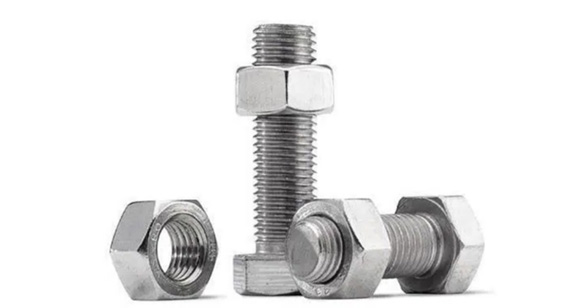
Bolts can be divided into several parts, each serving an important function:
These different components work together to ensure the bolt performs as intended, making it essential to understand the specific type required for a particular task.
A screw, like a bolt, is a fastener, but it differs in its primary function. Screws are typically used to secure one object directly into a material, such as metal, wood, or plastic. Unlike bolts, screws do not require a nut for fastening.
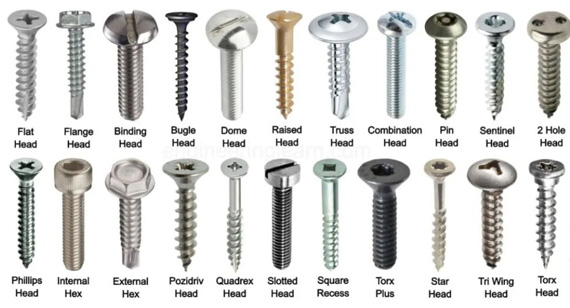
A screw is divided into several key parts:
The main difference between bolts and screws lies in how they fasten objects together. While bolts are used with nuts to secure parts, screws directly attach to materials, offering a more permanent solution.
Automotive bolts and screws are vital components in the construction and assembly of vehicles. These fasteners secure different parts of the car, from structural components to interior elements, ensuring safety, performance, and longevity. With various applications in the automotive industry, it's important to choose the right type of fastener. Bolts and screws can be classified based on their function, design, and materials. In this section, we will break down the classification into these three categories, helping you understand which fasteners are suitable for your needs.
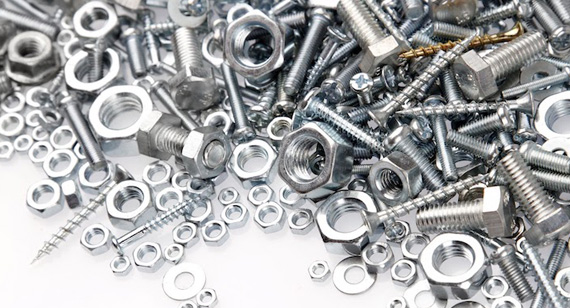
1. Based on Function
The function of an automotive bolt or screw is crucial in determining its suitability for specific applications within a vehicle. Automotive fasteners are designed to provide specific functions, including structural integrity, fastening, or special applications.
1.1 Automotive Structural Bolts and Screws
Automotive structural bolts and screws are primarily used in the car’s framework, including areas that must support heavy loads and stress. These fasteners are designed for high-strength applications, such as holding together the chassis, suspension components, and body structure. They need to withstand significant forces and vibrations without failing. Because of their critical role, these fasteners are often manufactured with enhanced materials such as steel or stainless steel and produced using CNC machining for high precision.
1.2 Fastening Automotive Bolts and Screws
These fasteners are used for securing automotive parts that do not experience high mechanical stress but still require a secure fit. This category includes fasteners for components like interior panels, trim, or non-critical attachments. While not subjected to extreme forces, these bolts and screws still need to be durable and reliable. Hexagonal head bolts or pan head screws are commonly used in this application for their ease of use and strength in lighter applications.
1.3 Special Automotive Bolts and Screws
Special automotive bolts and screws are designed for unique applications that require specific characteristics, such as heat resistance, corrosion resistance, or lightweight properties. Examples include bolts used in engines, exhaust systems, or electrical components. These fasteners often feature special coatings or are made from titanium or aluminum to meet the demands of the automotive industry. Custom CNC machining can be employed to create fasteners with specialized shapes or features for such applications.
2. Based on Design
The design of automotive bolts and screws plays a significant role in their functionality and ease of use. Fasteners come in various head types, thread designs, and other structural features to suit specific tasks.
2.1 Hexagonal Head Automotive Bolts and Screws
One of the most common designs, hexagonal head bolts, is frequently used in automotive applications for its strength and ease of use. The hexagonal shape allows for a secure grip when tightening or loosening with a wrench, making it ideal for structural applications or high-torque settings. This design is especially useful in the chassis assembly and engine components, where bolts must withstand significant mechanical forces.
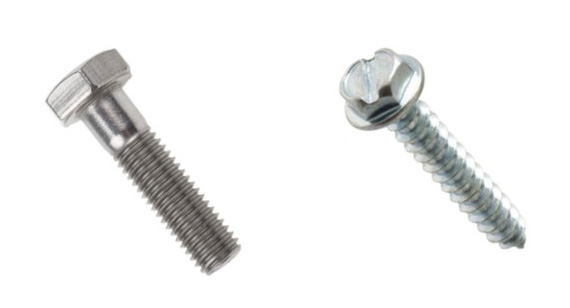
2.2 Flange Automotive Bolts and Screws
Flange bolts are designed with a built-in flange or washer at the base of the head, which helps distribute the load over a larger surface area. This reduces the risk of damaging the materials being fastened, especially in softer materials such as aluminum or plastic. Flange bolts are used in situations where additional surface area and load distribution are necessary, such as in body panels or brake assemblies.
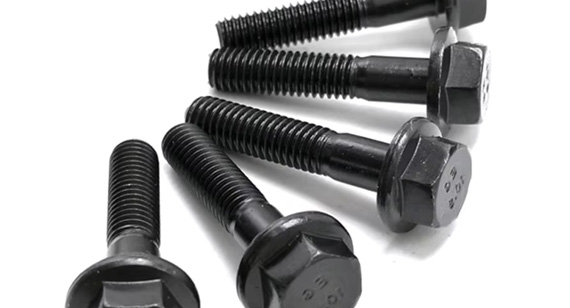
2.3 Flat Head Automotive Screws
Flat head screws have a low-profile head that is flush with the surface of the material when tightened. This design is ideal when a smooth surface is required, such as in interior applications or where aesthetics are important. Flat head screws are commonly used in trim pieces, dashboard assemblies, or interior fittings that need to maintain a sleek appearance.
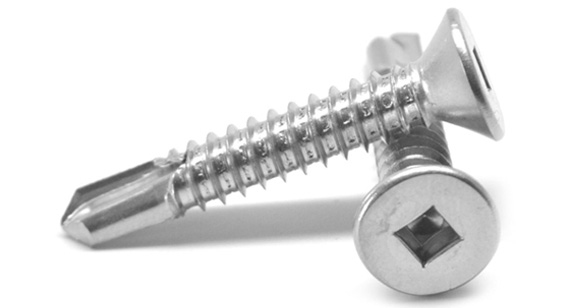
2.4 Pan Head Automotive Screws
Pan head screws are characterized by a rounded, smooth head that provides a larger surface area for tightening. This design is ideal for exterior applications, such as attaching trim pieces or securing panels where strength is important but the head needs to sit above the surface. Pan head screws are often used in underbody components or external body panels.
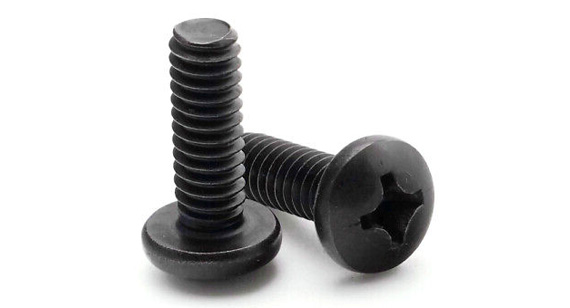
2.5 Hexagon Socket Automotive Screws
Hexagon socket screws, also known as Allen screws, have a recessed hexagonal hole in the head, which is designed to be tightened with a hex key or Allen wrench. This design is popular in automotive applications where a secure and tight fit is needed without protruding heads. These screws are typically used in tight spaces and for subassemblies where standard wrenches cannot fit.
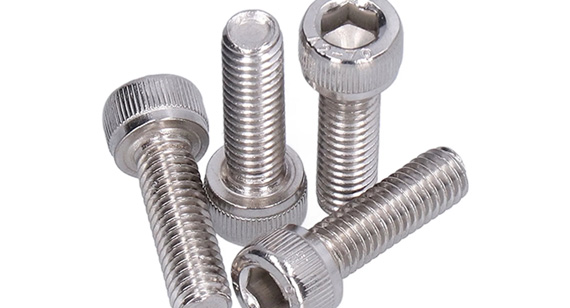
2.6 U-Bolts
U-bolts are used to attach components to a vehicle's frame or undercarriage, especially for securing parts like suspension springs, axles, or pipes. Their U-shaped design allows for a secure and stable attachment. U-bolts are critical for suspension systems and are typically made from steel or stainless steel for their strength and resistance to wear.
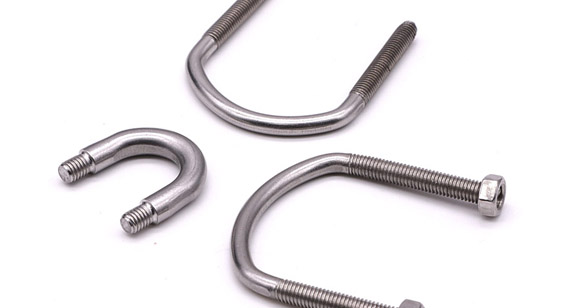
2.7 Carriage Automotive Bolts
Carriage bolts are designed with a rounded head and a square shoulder just beneath the head. This design helps to prevent the bolt from turning when it is tightened, offering a secure hold without needing a separate tool to grip the bolt. Carriage bolts are often used in frame assemblies or to secure metal components to the vehicle frame.
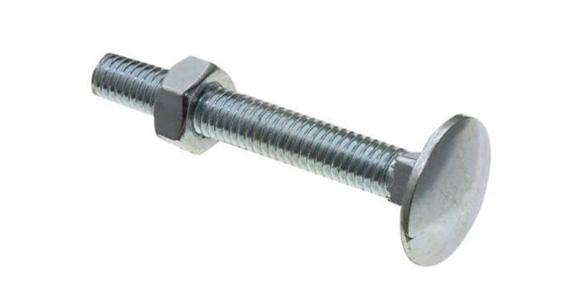
3. Based on Materials
The material of a bolt or screw is crucial for its strength, corrosion resistance, and overall durability in automotive applications. Different materials provide various benefits, making it essential to choose the right one based on the application's environment and demands.
3.1 Steel Bolts and Screws
Steel bolts and screws are the most commonly used fasteners in automotive manufacturing due to their strength, availability, and cost-effectiveness. Steel fasteners are suitable for structural applications where high strength is necessary, such as in the engine compartment or underbody systems. CNC machining can be employed to create precise steel fasteners that meet strict automotive specifications.
3.2 Stainless Steel Bolts and Screws
For applications where corrosion resistance is a priority, stainless steel bolts and screws are often the material of choice. These fasteners offer excellent resistance to rust and other environmental factors, making them ideal for engine parts, exhaust systems, or under-hood components that are exposed to heat and moisture. Stainless steel bolts also maintain their strength under high temperatures, which is essential for safety-critical automotive parts.
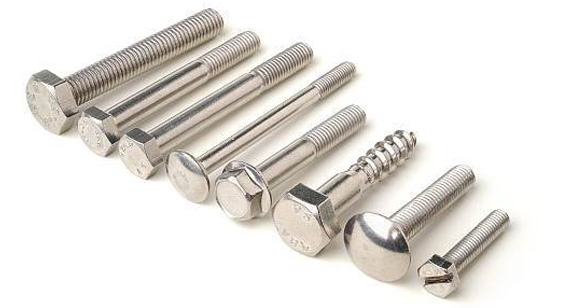
3.3 Titanium Bolts and Screws
Titanium bolts and screws are used in high-performance vehicles and applications where weight reduction is essential without compromising strength. Titanium is lightweight and has a high strength-to-weight ratio, making it ideal for racing cars, aerospace applications, or parts that require high durability under extreme conditions. CNC machining services can create titanium fasteners to meet exacting standards.
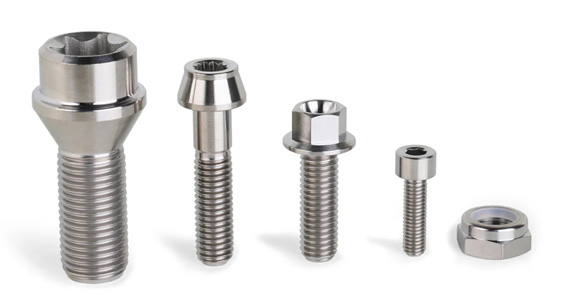
3.4 Aluminum Bolts and Screws
Aluminum bolts and screws are lightweight and corrosion-resistant, making them a popular choice for automotive applications where weight savings are crucial, such as in body panels or lightweight vehicle frames. Aluminum fasteners are also commonly used in electric vehicles and hybrid cars to reduce overall weight while maintaining strength.
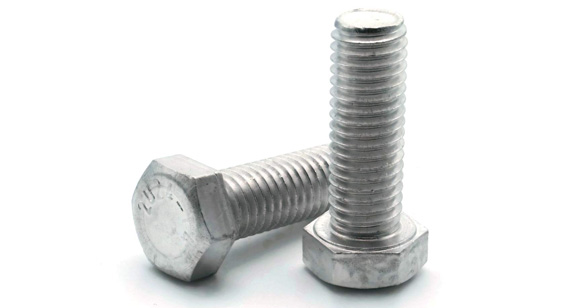
3.5 Plastic Bolts and Screws
While plastic bolts and screws are not commonly used in high-stress automotive applications, they are suitable for interior parts, lightweight components, and applications where corrosion resistance is needed. Plastic fasteners are often used for non-structural applications, such as attaching dashboard components or interior trim.
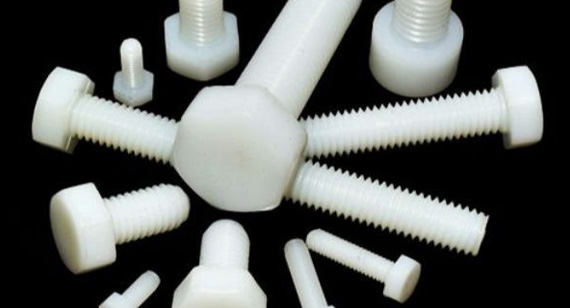
In conclusion, the classification of automotive bolts and screws based on function, design, and materials ensures that the right fastener is chosen for each specific application. Whether you’re using bolts and screws for structural integrity, aesthetic appeal, or corrosion resistance, understanding their different categories helps you select the most appropriate option for your needs.
The manufacturing of automotive bolts and screws is a critical process that requires careful consideration of various factors to ensure that these fasteners meet the specific demands of the automotive industry. Automotive bolts and screws are used in a range of applications, from engine parts to body panels, and must withstand the harsh conditions that vehicles face on the road. Given the importance of these fasteners in ensuring vehicle safety, durability, and performance, manufacturers must overcome several challenges during production. In this section, we will explore the key challenges and considerations involved in the manufacturing of automotive bolts and screws, focusing on corrosion resistance, proper fastening technology, and compatibility with different materials.
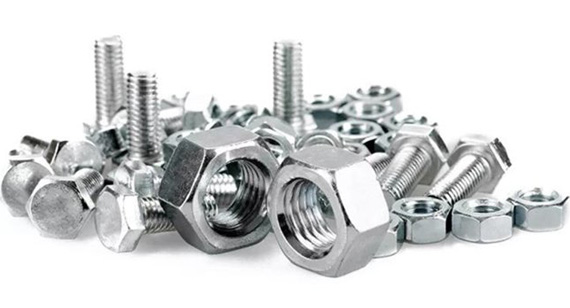
Corrosion Resistance
One of the most significant challenges when manufacturing automotive bolts and screws is ensuring that these fasteners are resistant to corrosion. Corrosion is a constant threat to automotive components, particularly in areas that are exposed to the elements, such as the exterior of vehicles, the engine compartment, or parts that come into contact with water, salt, or chemicals.
To combat corrosion, manufacturers often use materials like stainless steel, aluminum, and titanium, which naturally offer greater resistance to rust and other forms of deterioration. Additionally, bolts and screws may be treated with protective coatings such as zinc plating, galvanization, or anti-corrosion coatings. These coatings provide an additional layer of protection to extend the lifespan of the fasteners.
However, achieving the right balance between strength and corrosion resistance is a delicate process. For example, while stainless steel offers excellent corrosion resistance, it may not always provide the same strength as high-grade steel. Similarly, aluminum may offer lightweight benefits but could require additional treatments to meet the necessary corrosion resistance standards for specific automotive parts. Manufacturers need to ensure that the materials chosen for automotive bolts and screws are suitable for the intended application and capable of withstanding environmental challenges.
Proper Fastening Technology
Another key challenge in the manufacturing of automotive bolts and screws is selecting the proper fastening technology to ensure that these fasteners function effectively under varying conditions. Fastening technology refers to the techniques and tools used to tighten and secure bolts and screws during assembly. In the automotive industry, where precision is essential, it is crucial to use the appropriate torque settings and fastening methods to prevent over-tightening or under-tightening of fasteners.
Under-tightened fasteners can lead to loosened parts and potential failures, while over-tightened fasteners can cause damage to materials or even lead to the fastener breaking. To prevent these issues, manufacturers rely on torque control systems, automated fastening equipment, and robotic systems that ensure a consistent and precise application of torque. CNC machining plays a key role here, as it allows for highly accurate production of bolts and screws to the required specifications.
In addition to the proper tightening technology, the design of the bolt or screw itself is crucial. Factors such as thread pitch, head design, and material choice all influence the effectiveness of the fastening. Manufacturers must consider the type of application—whether the fastener will be subjected to high vibration, heat, or moisture—when designing and producing the fasteners. Custom CNC machining offers the flexibility to create bolts and screws with specific design features to address these challenges.
Compatibility with Different Materials
Compatibility with the materials being fastened is another important consideration in the manufacturing of automotive bolts and screws. Automotive vehicles are made up of a wide variety of materials, including steel, aluminum, plastics, and composites, and each of these materials interacts differently with fasteners.
For example, when using steel bolts and screws with aluminum parts, it is essential to account for the potential risk of galvanic corrosion, which occurs when dissimilar metals come into contact in the presence of moisture. This type of corrosion can compromise the integrity of the fastener and the materials it is securing. To prevent this, manufacturers may use anti-corrosion coatings or opt for materials that are less likely to react with each other.
Another consideration is the material strength of the fastener relative to the components being fastened. High-strength steel bolts are necessary for structural applications, but when fastening materials like plastic or composites, using a high-strength bolt may result in damage to the material being fastened. On the other hand, using a lighter material such as aluminum bolts for heavy-duty applications may compromise the overall durability and performance of the vehicle.
Therefore, manufacturers must carefully consider the interaction between fasteners and materials, ensuring that the bolts and screws are compatible with both the materials they are securing and the environmental conditions they will face. This requires advanced knowledge of material science and the use of sophisticated manufacturing technologies such as CNC prototype machining, which allows for testing and fine-tuning of fasteners before they are mass-produced.
In conclusion, the manufacturing of automotive bolts and screws presents various challenges that must be addressed to ensure the performance, durability, and safety of these essential components. By considering factors such as corrosion resistance, proper fastening technology, and compatibility with different materials, manufacturers can produce fasteners that meet the high standards required in the automotive industry. As the demand for custom CNC machining and advanced fastening solutions continues to grow, manufacturers must keep evolving to meet the changing needs of the automotive market.
The risk of loosening automotive fasteners is a significant concern in the manufacturing and maintenance of vehicles. Loosening fasteners can lead to serious issues, including component failure, reduced safety, and increased maintenance costs. Automotive fasteners are subjected to intense forces such as vibration, thermal expansion, and mechanical stress, which can cause them to loosen over time. Therefore, preventing fastener loosening is critical to maintaining the structural integrity and performance of a vehicle. In this section, we will explore effective strategies to eliminate the risk of loosening automotive fasteners, focusing on choosing screwlock inserts, using washers, and testing torque.
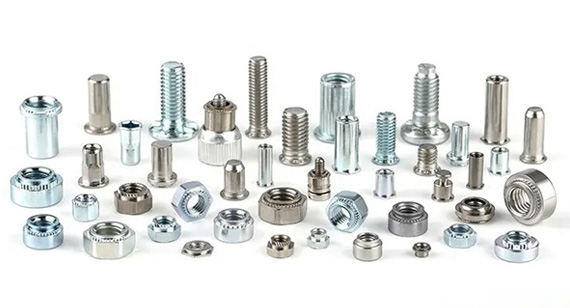
Choosing Screwlock Inserts
One of the most reliable methods to eliminate the risk of loosening automotive fasteners is to use screwlock inserts. These inserts are designed to enhance the grip of fasteners, making them more resistant to loosening under vibration and other mechanical stresses. A screwlock insert is a small, threaded component that fits into a hole or bore and holds the screw or bolt firmly in place.
There are different types of screwlock inserts, such as helical inserts, coil inserts, and plastic inserts, each offering unique advantages based on the application. Helical inserts provide additional thread engagement, improving the strength of the joint, while plastic inserts create friction between the fastener and the material, preventing rotation.
Using screwlock inserts is particularly beneficial in automotive applications where fasteners are exposed to constant vibration, such as in the engine bay, chassis, and underbody parts. By preventing fasteners from loosening, screwlock inserts not only enhance the reliability of the vehicle but also reduce the need for frequent maintenance and tightening.
Using Washers
Another effective way to prevent automotive fasteners from loosening is by incorporating washers into the assembly. Washers serve multiple functions in automotive applications, but one of their primary roles is to distribute the load of the fastener evenly across the surface, reducing the risk of damage or loosening over time.
There are several types of washers that can be used to enhance the stability of automotive fasteners, including flat washers, spring washers, and locking washers. Each type offers a unique benefit depending on the application:
In automotive applications, using the right type of washer can significantly improve the performance of fasteners. For example, locking washers are commonly used in critical components such as brake systems, suspension parts, and engine mounts, where preventing fastener loosening is essential for safety.
Testing Torque
An essential practice in eliminating the risk of loosening automotive fasteners is testing torque during assembly. Torque refers to the rotational force applied to a fastener when tightening it, and it plays a crucial role in ensuring that the fastener remains secure without damaging the material being fastened.
Over-tightening a fastener can lead to thread stripping, material deformation, or fastener breakage, while under-tightening can leave the fastener vulnerable to loosening. Therefore, testing torque is essential to achieve the proper balance.
In modern automotive manufacturing, torque control systems are used to precisely measure and adjust the amount of torque applied to each fastener. These systems can be manual or automated and are commonly found in CNC machining operations. By using torque wrenches, digital torque testers, or automated fastening systems, manufacturers can ensure that fasteners are tightened to the correct specification, significantly reducing the risk of loosening over time.
Additionally, testing torque allows for the identification of problematic fasteners and the detection of loose connections early on, further minimizing the risk of failure. This practice is especially important during prototype machining or the production of custom CNC machining parts, where precision is paramount to the success of the final product.
Conclusion
Eliminating the risk of loosening automotive fasteners is essential to ensure the safety, reliability, and performance of vehicles. By incorporating strategies such as choosing screwlock inserts, using washers, and testing torque, manufacturers can enhance the durability and longevity of fasteners in automotive applications. As automotive technology advances, the use of custom CNC machining and innovative fastening solutions continues to evolve, helping to meet the growing demands for safety and performance in the automotive industry.
The automotive industry is constantly evolving, with an increasing demand for high-performance materials, safety, and reliability. As a result, innovations in automotive bolts and screws play a crucial role in meeting these demands. These fasteners are not only vital for securing various automotive components, but they also need to withstand harsh conditions, including extreme temperatures, vibration, and corrosion. The latest advancements in automotive bolt and screw technology are improving their functionality and performance, allowing manufacturers to design more durable, efficient, and sustainable vehicles. In this section, we will explore some of the most notable innovations in automotive bolts and screws, including lightweight materials, self-locking mechanisms, anti-corrosion coatings, and smart bolts with embedded sensors.
Using Lightweight Materials
One of the significant innovations in automotive bolts and screws is the use of lightweight materials. As the automotive industry pushes toward reducing vehicle weight for improved fuel efficiency and lower emissions, lightweight fasteners have become a key area of focus. Materials such as aluminum, titanium, and composite materials are being increasingly used for bolts and screws, offering both strength and reduced weight.
By reducing the overall weight of fasteners, manufacturers can meet stringent fuel efficiency standards while maintaining the strength and reliability needed for critical automotive applications.
Self-Locking Mechanisms
Another innovative development in automotive bolts and screws is the use of self-locking mechanisms. These advanced fasteners are designed to remain secure without the need for additional components such as washers or thread-locking adhesives. The self-locking feature prevents the fasteners from loosening under vibration, shock, or thermal expansion—common challenges in automotive environments.
Self-locking bolts and screws are widely used in high-vibration areas such as engines, chassis, and suspension systems. They rely on mechanisms such as deformed threads, nylon inserts, or wedge-locking technology to create resistance to loosening. The added benefit of self-locking fasteners is their ease of use, as they eliminate the need for additional locking devices, streamlining the assembly process and reducing maintenance costs.
These fasteners enhance the overall safety and performance of automotive components, as they reduce the risk of fastener loosening, which can lead to failures or accidents.
Anti-Corrosion Coatings
Corrosion is a major concern for automotive fasteners, especially those exposed to harsh environmental conditions, including salt, water, and chemicals. To address this, manufacturers have introduced anti-corrosion coatings for bolts and screws, significantly extending their lifespan and performance.
Various types of anti-corrosion coatings are used in automotive fasteners, such as:
These coatings are essential for maintaining the performance and durability of automotive bolts and screws, ensuring that they continue to perform effectively over time, even in extreme conditions.
Smart Bolts with Embedded Sensors
The rise of smart technology in the automotive industry has also led to the development of smart bolts with embedded sensors. These smart fasteners are equipped with sensors that can monitor stress, temperature, and tension in real time. The data collected by these sensors can be used for predictive maintenance and performance monitoring, allowing for early detection of potential issues before they lead to failure.
For example, smart bolts with temperature sensors can monitor the heat levels in critical engine components, alerting technicians if temperatures exceed safe thresholds. Additionally, stress sensors can measure the amount of load on fasteners in high-stress areas like the suspension and chassis, ensuring that fasteners remain within safe operational limits.
These advanced fasteners are particularly beneficial for high-tech automotive applications, such as autonomous vehicles, electric cars, and electric vehicle charging stations, where real-time data and performance monitoring are critical for operational safety and reliability.
If you're looking to test the quality, durability, and functionality of automotive components or assemblies, it's crucial to have access to high-quality automotive bolts and screws. CNC machining services can provide custom CNC machining parts, including bolts and screws designed to meet the specific requirements of your automotive testing process. Whether you need stainless steel bolts for high-corrosion environments or lightweight aluminum bolts for performance testing, CNC machining allows for precise and reliable fasteners tailored to your exact specifications.
Working with a CNC machining factory can help ensure that the fasteners you use in your testing process meet the necessary standards for performance, durability, and safety. Whether it's for prototype testing or final production, automotive CNC machining parts play a vital role in ensuring the quality and reliability of your automotive components.

The innovations in automotive bolts and screws are driving significant improvements in vehicle performance, safety, and efficiency. By incorporating lightweight materials, self-locking mechanisms, anti-corrosion coatings, and smart bolt technology, manufacturers are better equipped to meet the demands of the modern automotive industry. As automotive technology continues to evolve, these fasteners will play an increasingly important role in ensuring that vehicles remain safe, reliable, and sustainable. When you require precise, high-quality automotive bolts and screws for your applications or testing, partnering with a CNC machining service that specializes in custom CNC machining parts can help you achieve the best results for your projects.
What is the difference between a bolt and a screw?
A bolt typically has a larger diameter and is used with a nut or washer to secure materials together. It usually requires a nut for fastening and is tightened with a wrench. A screw, on the other hand, has threads on its shaft that allow it to fasten directly into a material without needing a nut. Screws are generally smaller and used in applications where only one fastening piece is required.
What are the most common automotive bolts?
Common automotive bolts include hex bolts, carriage bolts, U-bolts, and flange bolts. These bolts are used in various automotive applications, including engines, brakes, suspension systems, and chassis components. The choice of bolt depends on the application, with each bolt offering specific strength and corrosion resistance properties.
What is the internal threaded portion of a bolt called?
The internal threaded portion of a bolt is called the nut. The nut is typically used in conjunction with a bolt to securely fasten components. It is threaded internally to match the external threads of the bolt, creating a tight connection when tightened.
How do automotive bolts differ from regular bolts?
Automotive bolts are designed to meet the demanding conditions found in vehicles. They are typically made from stronger materials such as stainless steel, titanium, or high-strength steel to handle high stresses and vibration. Additionally, automotive bolts often feature anti-corrosion coatings and are engineered to resist loosening due to vibration or thermal expansion, which is less critical in regular bolts.
What bolts are used in cars?
Cars use a variety of bolts, depending on the application. Common bolts in vehicles include hex head bolts for structural components, U-bolts for suspension systems, and flange bolts for components requiring a flat mating surface. Stainless steel bolts and grade 8 bolts are also common in high-stress and high-temperature areas like the engine and exhaust system.
What grade are automotive grade bolts?
Automotive grade bolts typically range from grade 5 to grade 8. Grade 5 bolts are commonly used in non-critical automotive applications, while grade 8 bolts are designed for heavy-duty tasks that require higher strength and resilience. Grade 10.9 bolts are sometimes used for extreme-duty applications in heavy vehicles.
Is a grade 8 bolt good for cars?
Yes, grade 8 bolts are suitable for heavy-duty applications in cars. These bolts have a higher tensile strength compared to grade 5 bolts, making them ideal for engine parts, suspension systems, and brakes, where strength and durability are critical.
Are grade 10 bolts stronger than grade 8 bolts?
Yes, grade 10 bolts are stronger than grade 8 bolts. Grade 10 bolts have a higher tensile strength and are designed for even more demanding applications, such as heavy machinery or high-performance vehicles. These bolts are typically used in more extreme conditions compared to grade 8 bolts.
Is grade 5 good for cars?
Grade 5 bolts are suitable for most automotive applications, but they are not as strong as grade 8 bolts. Grade 5 bolts are commonly used for non-critical components, such as interior panels, trim parts, and body parts. For high-stress areas like engines or brakes, stronger bolts like grade 8 or grade 10 are preferred.
When should you not use grade 8 bolts?
Grade 8 bolts should not be used in applications where brittleness is a concern. While they have excellent tensile strength, they are more likely to fracture under certain conditions, such as shock loads or excessive bending forces. In these cases, other materials or grades, such as grade 5 or titanium bolts, may be more appropriate.
What is grade 3 on cars?
Grade 3 bolts are typically low-strength bolts, often used in non-critical applications. These bolts are lower in tensile strength compared to grades 5 and 8, and they are rarely used in critical automotive areas such as engines or suspension systems. They are generally employed in light-duty applications like interior fittings and plastic components.
How do you tell the difference between a grade 5 bolt and a grade 8 bolt?
The easiest way to differentiate a grade 5 bolt from a grade 8 bolt is by the markings on the head of the bolt. A grade 5 bolt will typically have three radial lines, while a grade 8 bolt will have six radial lines. Grade 8 bolts are stronger, and this marking helps distinguish between the two in terms of tensile strength.
What does 10.9 mean on a bolt?
The 10.9 marking on a bolt refers to the bolt's tensile strength and yield strength. It indicates a high-strength metric bolt, often used in heavy-duty applications. The first number (10) represents the bolt's tensile strength in megapascals (MPa), and the second number (9) represents its yield strength. A 10.9 bolt has a tensile strength of 1,000 MPa, making it suitable for high-stress applications.
What is the hardest grade of bolt you can buy?
The hardest grade of bolt typically available is grade 12.9. These bolts have an extremely high tensile strength and are used in the most demanding applications, such as heavy-duty machinery and military vehicles. However, they can be more prone to brittleness and should not be used in applications requiring flexibility.
Can you weld a grade 5 bolt?
It is possible to weld a grade 5 bolt, but it is generally not recommended. Grade 5 bolts are made of medium carbon steel, which can be difficult to weld without causing issues such as cracking or brittleness in the welded area. If welding is required, it's essential to use the correct welding procedures and to heat treat the bolt afterward to maintain its strength.
How much torque can a grade 5 bolt withstand?
The amount of torque that a grade 5 bolt can withstand depends on its size and the application. In general, grade 5 bolts can handle around 120,000 psi (pounds per square inch) of tensile strength. It's important to use the correct torque settings to avoid over-tightening, which could lead to damage or failure.
Is the weld stronger than the bolt?
In most cases, a weld is stronger than a bolt if done properly. A weld creates a continuous bond between two materials, while a bolt relies on its threads for holding power, which may be weaker in certain high-stress situations. However, the strength of the weld depends on the welding technique and materials used. In applications where high stress or dynamic loading is expected, bolts may still be preferred due to their ease of maintenance and replaceability.
Is the strength of stainless steel bolts higher than grade 5?
Stainless steel bolts can be stronger than grade 5 bolts, depending on the grade of stainless steel used. For example, 304 stainless steel bolts are corrosion-resistant but not as strong as grade 5 bolts. On the other hand, grade 316 stainless steel bolts, commonly used in marine applications, offer better strength and corrosion resistance than grade 5 bolts, especially in harsh environments. For automotive use, stainless steel bolts offer the advantage of corrosion resistance over strength alone.
